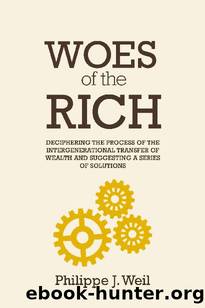Woes Of The Rich: Seeing Beyond The Money by Philippe J. Weil

Author:Philippe J. Weil [Weil, Philippe J.]
Language: eng
Format: epub
Published: 2020-02-17T20:00:00+00:00
13 / Trusts
The legal term âtrustâ has existed for over a thousand years in English law, and was also brought to America by the new settlers. The United States is the âland of unlimited trusts,â where wealth owners establish trusts to avoid paying inheritance tax and as an asset-protection measure. In Israel, too, the view is slowly taking root that trusts are a tool that preserves family money for every family member for a long time, but it is still not very widespread. The new regulatory environment and the consequent witch-hunt gave a fairly bad name to trusts as a legal institution. They appeared to be used to avoid paying taxes, or to hide money from the government or from the rest of the family, and the tax authorities very often perceive this as an attempt at manipulation by the wealthy. Nevertheless, the trust in its original essence is a protection of the family assets.
A trust is imperative when deceased parents leave behind young children, money and property. In such a situation, the protective presence of a close family member, lawyer or reliable friend of the parents is necessary, someone who will take care to preserve the young heirsâ money and property. A trust can also benefit affluent older people who find it too exhausting to care for their capital.
Structure of a trust fund
Trust: The legal body that guards family money and property for safekeeping.
Grantor/Settlor: The initial owner of capital who establishes the trust fund and bequests the money into the trust fund.
Beneficiary: An individual/family member for whom the money or property are deposited in the trust.
Trustee: A private individual, relative or stranger, office or trust company, bank or any other body that manages the trust.
Protector: A person chosen by the grantor/settlor of the trust, whose job it is to protect the interests of the beneficiaries, ensure that the trustee is doing his job and keep track of procedures. The protector can be a close acquaintance of the family or a public figure without any personal interest, but one who is familiar with the family spirit and the founderâs intention, and the trustee is invited to consult with him. In extreme cases, the protector can replace a trustee with another trustee.
Trust agreement: The grantor/settlor of the trust is the sovereign ruler of the trust kingdom, for his money and property are the basis of the trust. Upon establishing the trust he determines its rules, who the beneficiaries are, when the beneficiaries have the right to receive their money, and under what conditions. The founders of the trust usually note in the trust agreement what the money will be used for when the beneficiaries reach the appropriate age, often under certain conditions.
Download
This site does not store any files on its server. We only index and link to content provided by other sites. Please contact the content providers to delete copyright contents if any and email us, we'll remove relevant links or contents immediately.
Zero to IPO: Over $1 Trillion of Actionable Advice from the World's Most Successful Entrepreneurs by Frederic Kerrest(4573)
Machine Learning at Scale with H2O by Gregory Keys | David Whiting(4313)
Never by Ken Follett(3957)
Harry Potter and the Goblet Of Fire by J.K. Rowling(3858)
Ogilvy on Advertising by David Ogilvy(3622)
Shadow of Night by Deborah Harkness(3368)
The Man Who Died Twice by Richard Osman(3080)
Book of Life by Deborah Harkness(2939)
The Tipping Point by Malcolm Gladwell(2925)
Will by Will Smith(2920)
Purple Hibiscus by Chimamanda Ngozi Adichie(2855)
0041152001443424520 .pdf by Unknown(2846)
My Brilliant Friend by Elena Ferrante(2831)
How Proust Can Change Your Life by Alain De Botton(2814)
How to Pay Zero Taxes, 2018 by Jeff A. Schnepper(2655)
Hooked: A Dark, Contemporary Romance (Never After Series) by Emily McIntire(2555)
Rationality by Steven Pinker(2366)
Can't Hurt Me: Master Your Mind and Defy the Odds - Clean Edition by David Goggins(2342)
Borders by unknow(2315)
